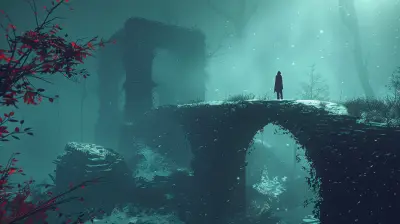Exploring the Deep Lore of Iconic JRPG Universes
16 July 2025
When we think about what makes JRPGs (Japanese Role-Playing Games) so unforgettable, it’s not just the epic boss battles, catchy soundtracks, or over-the-top character designs. Yeah, those things help — but let’s be honest — it’s the rich, emotional, and often mind-bending lore that keeps us talking about them years (heck, even decades) after the credits roll.
So, grab your potion bag and equip that +10 curiosity accessory. We're diving headfirst into the deep lore of some of the most iconic JRPG universes ever crafted. From world-ending gods to philosophical AI, these stories are way deeper than they first appear — like a treasure chest hidden under the surface of a serene yet suspiciously quiet lake.![]()
What Makes JRPG Lore So Special?
Before we start name-dropping our favorite games, let’s ask: Why is JRPG lore so captivating compared to other genres?Well, JRPGs love to build worlds—and I mean really build them. We’re talking complete world maps, fictional religions, ancient prophecies, family bloodlines, and even timelines that span millennia. The designers and writers don’t just want you to play the game. They want you to live in it.
And unlike Western RPGs, which often let you shape the story yourself, JRPGs tend to deliver a densely woven narrative. Sure, you’ll still make choices, but you’re more of a passenger on this emotional storytelling roller coaster — and that ride can get intense.![]()
Final Fantasy: More Than Just Summons and Spiky Hair
Let’s kick things off with the towering titan of JRPG lore: Final Fantasy.The Multiverse Magic
What’s wild about the Final Fantasy franchise is that each main title exists in its own universe. FFVII’s dystopian mako-fueled world has almost nothing in common with FFIX’s fantasy-centric kingdoms. And yet, there are recurring motifs: crystals, summons, Chocobos, and convoluted plots involving gods or ancient civilizations.The Deeper Threads
Dive into games like Final Fantasy X, and you’ll uncover layers of spiritual philosophy, commentary on religion, and the idea of cyclical suffering — where Sin literally represents a recurring judgment on humanity.Then you’ve got Final Fantasy VII, arguably the most lore-rich in the series. Beneath all the anti-corporate rebellion and tragic love stories, it’s really a tale about identity, humanity, and how trauma shapes both people and the world.
Bonus points: FFVII’s expanded universe (including Crisis Core, Advent Children, and the Remake series) adds even more to chew on.![]()
Persona: Jungian Psychology Meets High School Drama
At first glance, Persona games are all about teens navigating high school life while moonlighting as metaphysical monster slayers. But dig a little deeper, and things get weird in a good way.Shadows, Personas, and the Self
Much of the lore draws inspiration from Jungian psychology, particularly the idea of the “shadow self.” Every antagonist (and sometimes protagonist) has a side of themselves they’ve repressed. The real conflict? Facing that inner darkness to grow stronger.In Persona 5, for instance, the corrupt adult world manifests as twisted "palaces" built from psychological trauma and distorted desires. The party invades those palaces to force confessions and change hearts (kind of like vigilante therapists in trench coats).
A Shared Universe?
What’s cool is that all the Persona games exist within the broader Shin Megami Tensei multiverse. That’s right — all those angels, demons, and philosophy-heavy plots? Totally connected!Xenoblade Chronicles: When Sci-Fi Meets Spirituality
Oh boy. If you want a JRPG that’s practically begging you to watch multiple “lore explained” videos on YouTube, Xenoblade Chronicles is your jam.Gods Literally Built the World
In the first game, the entire world is set on the back of two dead gods, the Bionis and the Mechonis — gigantic beings frozen mid-battle. Yeah, you're running around on their bodies. Just let that settle for a minute.As the series goes on, the lore spirals into questions about creation, identity, and the role of artificial life. Xenoblade 2 even ties into the first game in ways that aren't fully revealed until hours and hours in — and Xenoblade 3 connects everything on a cosmic scale.
Existential AF
What makes Xenoblade so immersive is that it doesn’t spoon-feed you the story. If you want the full picture, you’ve got to pay attention, talk to NPCs, read item descriptions, and connect the dots. It’s like a spiritual puzzle box wrapped in anime aesthetics.Chrono Trigger & Chrono Cross: Time Travel Done Right (and Then Weird)
Chrono Trigger is often dubbed the "perfect JRPG" — not just because of its gameplay and music, but because of how elegantly it handles one of the hardest story concepts ever: time travel.Multiple Timelines, One Goal
Your actions in the past change the future, and you’ll visit multiple eras — prehistoric times, the apocalypse, even a floating magic kingdom — to stop the world from ending.Then there’s Chrono Cross, the sequel that gets... well, complicated. It explores alternate dimensions, reincarnation, and the idea that your worldview shapes your reality. Some find it confusing, others find it brilliant.
Either way? That lore hits hard if you’re paying attention.
Nier & Drakengard: Post-Apocalyptic Philosophy with Extra Sadness
You haven’t truly gone down the JRPG rabbit hole until you’ve played something from Yoko Taro.Nier Automata: Spoiler Alert — You're the Bad Guy
On the surface, Nier: Automata is about androids fighting for a ruined Earth. But slowly, chillingly, you realize the enemies you slaughter might be more human than you. The game forces you to play through multiple perspectives, challenging your own judgments and biases.The lore connects to Drakengard, a totally different series where making a pact with a dragon unleashes literal doomsday scenarios. Nier is actually an offshoot ending from one of Drakengard's endings. Yeah. Mind blown.
Taro’s games explore existential dread, identity, and the futility of war, all wrapped in obscure item descriptions and haunting soundtrack notes.
Fire Emblem: Political Intrigue with a Dash of Destiny
JRPG? Tactical RPG? Doesn't matter. Fire Emblem deserves a spot on this list for its complex, often interconnected lore.Beyond the Battlefield
Every battle in Fire Emblem feels high-stakes not just because of permadeath but because so much of the game is tied to character backstories and world history. Whether it’s Three Houses diving deep into church vs. state, or Genealogy of the Holy War exploring bloodlines and ancient pacts, the lore here runs deep.You’re not just moving units around a grid; you’re participating in generational conflicts, mythic legacies, and cultural evolutions across kingdoms.
Shin Megami Tensei: Morality and Metaphysics Collide
While Persona is the more popular spinoff, the mainline Shin Megami Tensei (SMT) games are an entirely different beast.Choice Has Consequences
SMT games are famed for their brutal difficulty — but also for their unapologetically philosophical lore. Every major choice pushes you toward Law, Chaos, or Neutrality. Siding with angels might bring order, but at the cost of freedom. Siding with demons gives you freedom but… well, hell breaks loose.These aren’t simple “good vs. evil” stories. They ask: What kind of world do you want to live in — and what are you willing to sacrifice to make it real?
If you’re into theological debates, apocalyptic existentialism, and summoning demons from a flip phone, this series is gold.
Kingdom Hearts: Disney Meets Darkness
Alright, this one’s a bit of a meme at this point — but Kingdom Hearts still earns a place thanks to its incredibly dense lore.More Than Just Mickey and Sora
Yes, it’s Disney meets anime. But behind the scenes? We’ve got ancient Keyblade Wars, simulations within simulations, and conspiracies that span realities. Oh, and don’t forget the multiple incarnations of the same villain across different timelines.It’s like a JRPG soap opera dipped into a Saturday morning cartoon — chaotic but oddly compelling.
Why JRPG Lore Sticks with Us
What truly makes these stories unforgettable is how personal they feel. Sure, saving the world is cool and all, but JRPGs make it emotional. They make you care about these characters and their struggles. Heck, sometimes you spend more time reading flavor text and character logs than fighting enemies.And just when you think you’ve figured it all out? There's an obscure item in a secret dungeon that rewrites everything you thought you knew.
Final Thoughts: Lore Isn’t Just Backstory, It’s Heart
JRPGs prove that lore isn't just fluff or filler — it's the heart and soul of the experience. It's what turns a game from a weekend playthrough into a lifelong memory.So whether you're a seasoned lore-hound who reads every in-game book or a curious newbie wondering what all the fuss is about, one thing’s for sure: JRPGs offer some of the richest, most fascinating narratives in gaming. And we’ve only scratched the surface.
There are still dozens more universes waiting to be deciphered — from the Tales series to Suikoden to Atelier. Maybe we’ll unpack those next time?
Till then, keep those save files safe and your inventory sorted. Adventure (and lore) awaits.
all images in this post were generated using AI tools
Category:
JrpgsAuthor:

Kaitlyn Pace
Discussion
rate this article
1 comments
Spike Ross
Fascinating read! What hidden connections and secrets do you think the lesser-known JRPGs might reveal about their worlds?
August 4, 2025 at 2:46 PM

Kaitlyn Pace
Thank you! Lesser-known JRPGs often have rich narratives that delve into cultural lore, hidden character backstories, and subtle world-building details that can reveal much about their settings and themes. Exploring these can uncover unique perspectives on familiar tropes.


